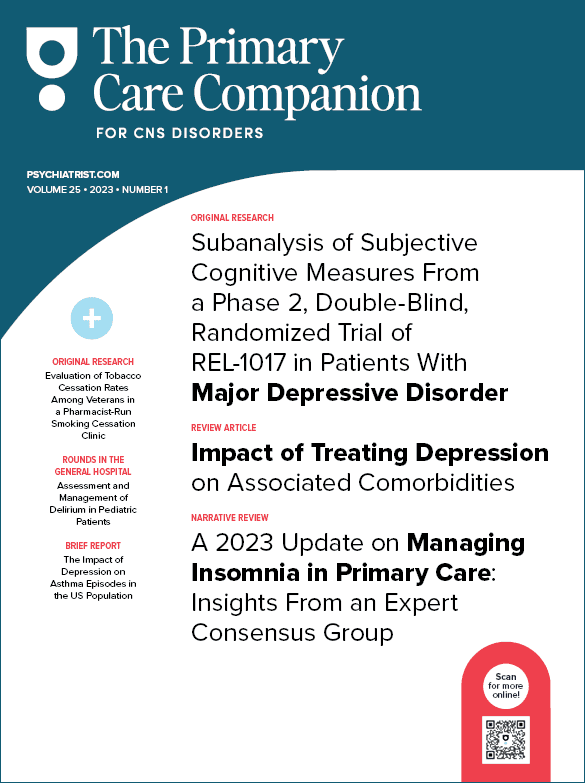
Prim Care Companion CNS Disord 2021;23(4):20l02863
To cite: Mashiana MK, Irfanullah Z, Khawaja H, et al. A case of persistent relapsing regression with infantile speech responding to methylphenidate therapy. Prim Care Companion CNS Disord. 2021;23(4):20l02863.
To share: https://doi.org/10.4088/PCC.20l02863
© Copyright 2021 Physicians Postgraduate Press, Inc.
aMerit Health Wesley, Hattiesburg, Mississippi
bZiauddin University, Karachi, Pakistan
cUniversity of Texas at Dallas, Richardson, Texas
dMD TruCare PA, Grapevine, Texas
eDepartment of Psychiatry, University of Oklahoma, Oklahoma City, Oklahoma
fMinnesota Regional Sleep Disorders Center, Department of Psychiatry, Hennepin County Medical Center, Minneapolis, Minnesota
gUniversity of Minnesota Medical School, Minneapolis, Minnesota
*Corresponding author: Manjot Kaur Mashiana, DO, Merit Health Wesley, 6001 Hardy St, Hattiesburg, MS 39402 ([email protected]).
Regression is an unconscious, immature form of defense mechanism typically in response to distress, causing the “brain-mind1” to go into a stage of earlier life development. We present a case of infantile speech that improved with methylphenidate. This is the first case report, to our knowledge, of pathological regression with infantile speech successfully treated with methylphenidate.
Case Report
Ms A, a 51-year-old woman, presented to the psychiatric clinic in April 2019 with a previous diagnosis of major depressive disorder (9-item Patient Health Questionnaire [PHQ-9]2 score of 16) and generalized anxiety disorder. She reported a history of varying degrees of abuse in her childhood and adulthood with “spotty” childhood memories. She denied any symptoms suggestive of a dissociative disorder. Additionally, she had a concussion 10 years ago, with a few minutes’ loss of consciousness—neurologic workup, including electroencephalography, was within normal limits. Family history was notable for borderline personality disorder and bipolar disorder in her daughter. At the time of the first visit, the pharmacologic regimen consisted of sertraline 100 mg daily, subsequently increased to 150 mg daily, and gabapentin 100 mg twice daily.
At the beginning of May 2019, Ms A expressed concerns about difficulty concentrating and focusing, as well as increased anxiety when leaving the house. Her husband mentioned that she frequently exhibited a “child-like speech” more prominent in the mornings, lasting from days to months without other infantile behaviors. The patient’s daughter had an episode of severe depression, which could have triggered her depressive episode. Her sertraline dosage was increased to 200 mg daily.
Two weeks later, the patient and her husband returned with Ms A’s behavior worsening, including increased child-like talk, inability to hold intelligent conversations, and crying spells. She was referred to a neurologist to rule out organic causes of infantile behaviors. The patient’s psychiatrist initiated a trial of methylphenidate 10 mg daily for her attention and focus issues.
In July 2019, Ms A’s daily methylphenidate dose was increased to 20 mg in the morning and 10 mg in the evening. The patient and her spouse reported substantial improvement in both her depression and infantile speech with marked decline in crying spells. Her husband mentioned that she was “not acting like a child in the mornings anymore.”
In October 2019, however, Ms A noted that while her child-like speech had attenuated substantially, the addition of methylphenidate had exacerbated her preexisting anxiety levels. Her psychiatrist decreased the methylphenidate dose to 15 mg every morning and 10 mg every evening and added buspirone 10 mg twice daily to combat her heightened anxiety. In the months that followed, the patient reported significant improvement in her quality of life and overall functionality. Her PHQ-9 score decreased in May 2020 (PHQ-9 score of 7).
Discussion
Sigmund Freud described regression as a defense mechanism in which the ego reverts to an earlier stage to protect the ego from pain, allowing one to exclude an experience and its associated emotions from consciousness.3 Regression has become necessary at times in recovery from a mental illness.4 Patients may present acting childishly, with whining, rocking, and temper tantrums and may be physically abusive.5
When contemplating regression, identification of other determinants is pertinent, as treatment is focused on managing the underlying etiology. Sources of regression include poor coping ability, psychotic disorders, major depressive disorder, dissociative disorder, bipolar personality disorder, and substance abuse disorders.5 Additional triggers for an infantile speech include sleep-related dissociative disorders and sleep-related sexual seizures.6,7 Treatment is categorized into behavioral (emphasizing), pharmacologic (antidepressants, benzodiazepines, antipsychotics), and nonpharmacologic (electroconvulsive therapy).3
Our case illustrates the potential use of methylphenidate, a psychostimulant with noradrenergic-dopaminergic reuptake properties, in providing treatment for infantile speech and behavior, at least in adults. Further research is needed on this novel treatment approach for persistent regressive infantile speech.
Published online: August 12, 2021.
Potential conflict of interest: None.
Funding/support: None.
Patient consent: Permission was received from the patient to publish this case report, and information (including dates) has been de-identified to protect anonymity.
References (7)

- Fosse R, Stickgold R, Hobson JA. Brain-mind states: reciprocal variation in thoughts and hallucinations. Psychol Sci. 2001;12(1):30–36. PubMed CrossRef
- Kroenke K, Spitzer RL, Williams JB. The PHQ-9: validity of a brief depression severity measure. J Gen Intern Med. 2001;16(9):606–613. PubMed CrossRef
- Hentschel U. Defense Mechanisms: Theoretical, Research, and Clinical Perspectives. Vol 136. 1st ed. Amsterdam, North-Holland: Elsevier Science;2004.
- Mercer J. The concept of psychological regression: metaphors, mapping, Queen Square, and Tavistock Square. Hist Psychol. 2011;14(2):174–196. PubMed CrossRef
- Lokko HN, Stern TA. Regression: diagnosis, evaluation, and management. Prim Care Companion CNS Disord. 2015;17(3): doi:10.4088/PCC.14f01761. PubMed
- Schenck CH, Milner DM, Hurwitz TD, et al. Dissociative disorders presenting as somnambulism: polysomnographic, video, and clinical documentation (8 cases). 1989;2(4):194–204.
- Voges BR, Schmitt FC, House PM, et al. Complex sexual behaviors during sleep as a manifestation of epilepsy: a case series. Sleep. 2019;42(3):zsy233. PubMed CrossRef
Enjoy free PDF downloads as part of your membership!
Save
Cite
Advertisement
GAM ID: sidebar-top




